2022 Annual Report
2022 Year In Review
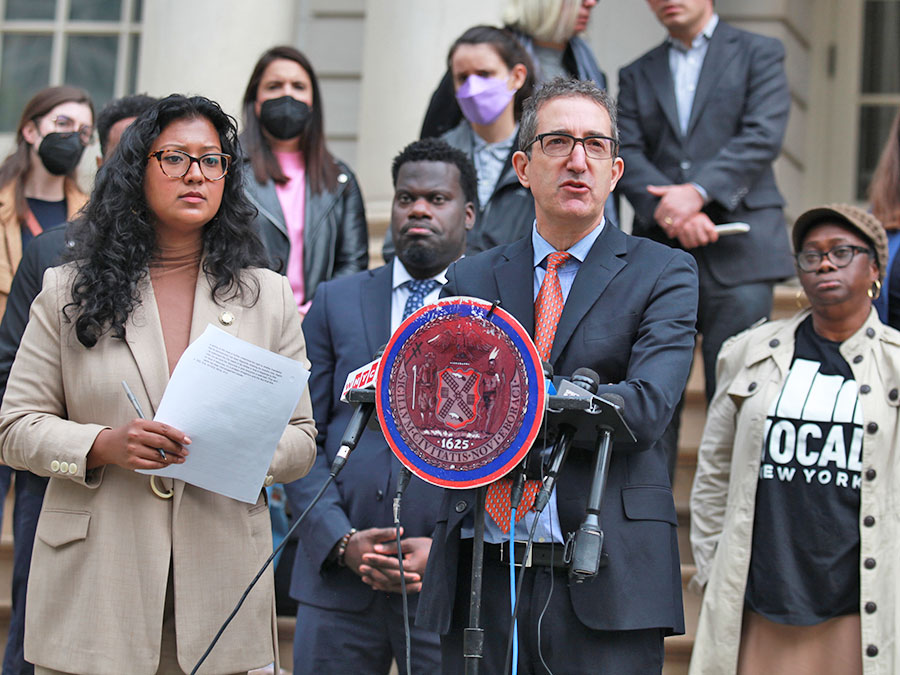
Moving Forward With Resolve
The Legal Aid Society handles hundreds of thousands of legal matters, but we measure our impact in terms of the more than 1.5 million vulnerable New Yorkers served by that work. We represent clients across many different areas of the law, giving us an up-close view of New Yorkers’ day-to-day challenges, how they are impacted by laws and policies, and their interactions with city and state agencies. We leverage this unique perspective in combination with impact litigation and advocacy to dismantle oppressive systems and to help build new systems that uplift marginalized communities.
At the height of the pandemic, we were assisting our clients in navigating a court system that, though relying on a range of technologies for interaction, was still set up so that the monied, who could easily afford an attorney, got results.
But we learned from the experience, and emerged from the pandemic more dexterous than ever. We continue to be a touchstone, in a changing legal landscape, for people with limited resources. And our learnings have enabled us to better serve our clients, helping them navigate the court system as it returns to normal.
We also continue to grow our strategy of working across different units within the organization to best connect clients with critical resources that address their ongoing needs and obstacles. Our core strength, in fact, lies in our solidarity across units and practices.
This year, for example, we ensured safe and affordable housing for 60,000 New Yorkers through the holistic approach utilized by our Housing Justice units, which combines eviction defense in housing court, enforcement of housing maintenance codes, tenant association advocacy, litigation to block limits on rent subsidies, and advancing legislation to stop unwarranted rent increases and evictions. The work of these units ensured that more New Yorkers were able to continue living in their homes despite rising rates of eviction following the expiration of the eviction moratorium. As New York City struggles with housing costs soaring to record levels, recouping the nearly one million jobs lost during the pandemic, and a surging homeless population driven by thousands of migrants transferred to the area from southern states, The Legal Aid Society’s focus on economic justice and equity is as important as ever. Despite a challenging funding landscape and fewer staff, we have redoubled our efforts to help our low-income clients deal with an exponential growth in poverty, inflation, cost of living increases, and disenfranchisement. Whether it be ensuring the people we serve remain in safe and affordable homes, gain access to life-saving medical care or medical benefits they never had before, obtain work authorization, child support, or cash assistance—we are here for them.
Bettering Clients’ Lives Through Direct Representation
Our attorneys are winning battles every day through direct representation work that improves the lives of our clients.
2022 ANNUAL REPORT
Bettering Clients’ Lives Through Direct Representation
Whether it’s the teenager facing suspension from school, the TGNCNBI+ person who needs to legally change their name to obtain government benefits, or the tenant battling a landlord attempting an end run around Right to Counsel laws by collecting back rent in small claims court – our two thousand attorneys are winning battles every day through direct representation work that improves the lives of our clients.
Holistic advocacy is the hallmark of our direct representation: attorneys, paralegals, investigators, case handlers, and social workers, exploring all angles of their clients’ cases, relentlessly seeking to avoid unnecessary and unjust treatment under the law, while connecting clients with critical resources that address ongoing needs and obstacles.
Our education teams, for example, offers attorneys and social workers who provide direct representation services, such as assisting families with representing students in school disciplinary proceedings, or advocating for students at school meetings and mediations. Our staff combines this with community training programs or medical or legal partnerships that in turn ensure students receiving behavioral health treatment are able to access appropriate educational services. This sort of wraparound service transcends a traditional definition of legal victory, resulting in clients who receive support services that make a meaningful difference in their lives. This can in turn can mean the difference between obtaining an education and transitioning into adulthood, or adulthood or being funneled into the school-to-prison pipeline – an outcome whose value is immeasurable.
Similarly, the Criminal Defense Practice, which was a citywide public defender long before the United States Supreme Court mandated a constitutional right to public defense almost 60 years ago, makes up our largest practice, and provides high-volume holistic direct representation services across all five boroughs. Our criminal investigators locate and interview witnesses, photograph crime scenes, serve subpoenas, and testify in court, and their work often leads to evidence that exonerates a client or mitigates the case facts.
We are there for our clients throughout the life of a case, obtaining dismissals or sentence mitigations for people with mental or substance abuse conditions, and ensuring they receive treatment instead of punishment. If they are convicted, our appeals and parole units ensure our clients’ rights are protected as they appeal their cases or after they return home from incarceration.
The Legal Aid Society has also stepped up as the economy continues to reel from the devastating impact of the pandemic. Low-income BIPOC clients experienced the highest rates of COVID-19 infections and hospitalizations and were at the same time most likely to lose their jobs and benefits, experience food instability, and face eviction from their homes. Despite this, the Civil Practice returned to its pre-pandemic level of handling nearly 52,000 legal matters, including almost 29,000 housing law and foreclosure matters led by our housing units, which benefitted nearly 60,000 New Yorkers. Outcomes significantly improved for these clients, allowing them to remain in safe and affordable homes, access life-saving medical care, or obtain work authorization, child support, or cash assistance.
This high volume of direct representation is the engine that fuels our legislative and litigation priorities, with the latter often arising from problems identified by the daily work of our offices across the city.
Client Stories: Camari Banks Finds a Safe Space at School, in Dance
After excessive bullying, a transfer to a new school gave Camari a fresh start. The rising senior has big plans.
2022 ANNUAL REPORT
Client Stories: Camari Banks Finds a Safe Space at School, in Dance
At 18 years old, Camari Banks is shy but self-assured. He is a high school student, a Popeye’s employee, a dancer, a loyal friend, and an older brother to three younger siblings.
Camari describes his upbringing as solid and loving. From a young age he took school seriously and felt a sense of ownership over his life, which he credits to his mom, Tanesha Aikens. But despite the warmth and support in his home, he experienced a different side of humanity in school. From age nine, Camari was picked on by classmates who called him gay. Peers accused him of not showing enough masculinity, something that confused him. He had never thought of this as a problem.
At a time when more young people than ever before identify themselves outside of the gender binary, many also face an increase in bullying—both in-person and online. These numbers are higher for those perceived to be part of the LGBTQ+ community.
The attacks Camari faced were exhausting and traumatic. In high school, with social media widely accessible, threats worsened. This past winter a physical fight broke out at school, with Camari’s sexuality the focus of the attack. Camari was suspended.
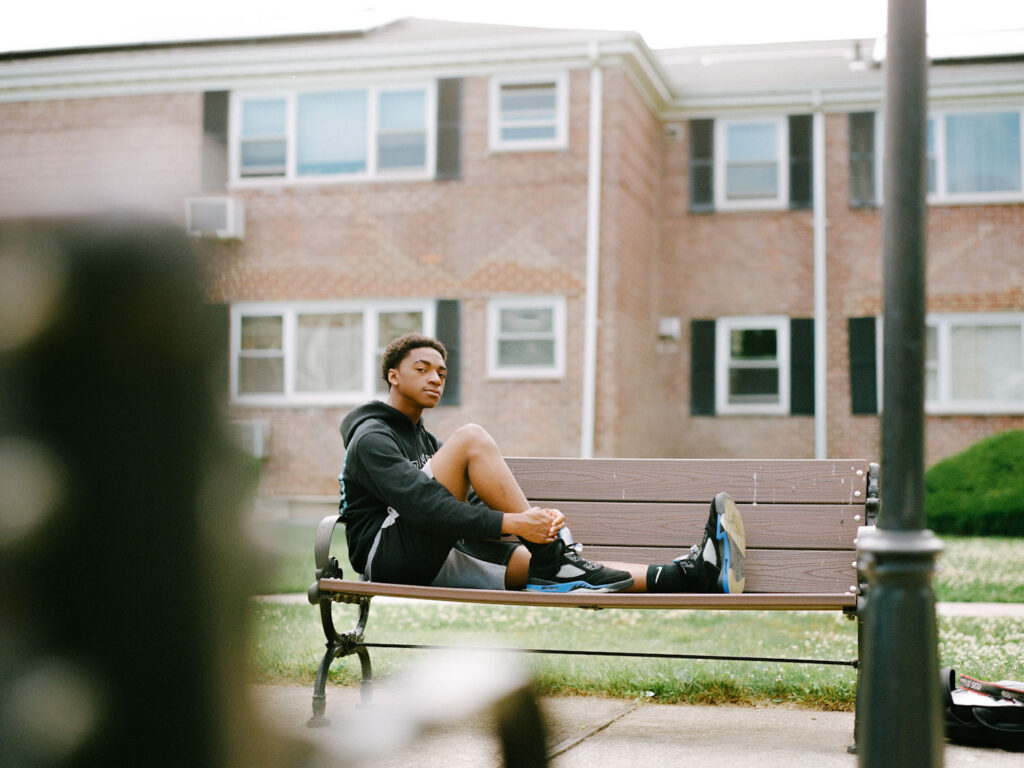
After the incident Camari received notice in the mail that he would face a suspension hearing. Through an online search Camari’s mom, Tanesha, connected with two lawyers: Marie Mombrun and Joel Pietrzak, from The Legal Aid Society’s Education Law Project (ELP). Mombrun and Pietrzak represented Camari at his suspension hearing—something that most of the time, students face without counsel.
ELP, a unit in Legal Aid’s Civil Practice, works on a variety of cases advocating for low-income children and families. With a holistic approach that often aids beyond just the legal situation, ELP assists young people through and beyond whatever educational issue they face. The ELP team considers the potential collateral consequences of a school situation and sets students up for growth beyond just negating the initial issue. Mombrun notes the importance of tackling suspension hearings with a firm understanding of the repercussions at stake. “Suspensions are somewhat of a portal to the school-to-prison pipeline,” she says. “If you only handle the suspension and don’t get to the root of the issue then it [the legal representation] doesn’t work.”
After reducing some of the charges, Mombrun and Pietrzak took on the next problem Camari faced—figuring out a safe way for him to get an education. They helped him transfer in April to a new high school in Lower Manhattan. He started at City-As-School, a public high school where students have a non-traditional class schedule—fewer and longer classes and an internship for part of the week. Camari chose an internship at a farm. At the new school, he is finally able to explore who he is without force or fear. Most importantly, though, he has been able to keep the positive parts from his life before, like his dance team.
This past semester marked Camari’s last season as a dancer with Secret Society Dance Company. He practiced almost every night of the week. Outside of school, work, and home, dance has been Camari’s calling throughout his teenage years, “my outlet,” he says. The team performs and competes around the city. Dance has been one of Camari’s saving graces—accentuating his open mind, fortifying his friendships, and providing him with a mentor in his coach, who Camari says touches on political and human rights issues through their routines.
He has found dance to be an incredibly non-discriminating practice. Camari’s hope is to find similar channels in the future— something City-As-School is helping him plan for.
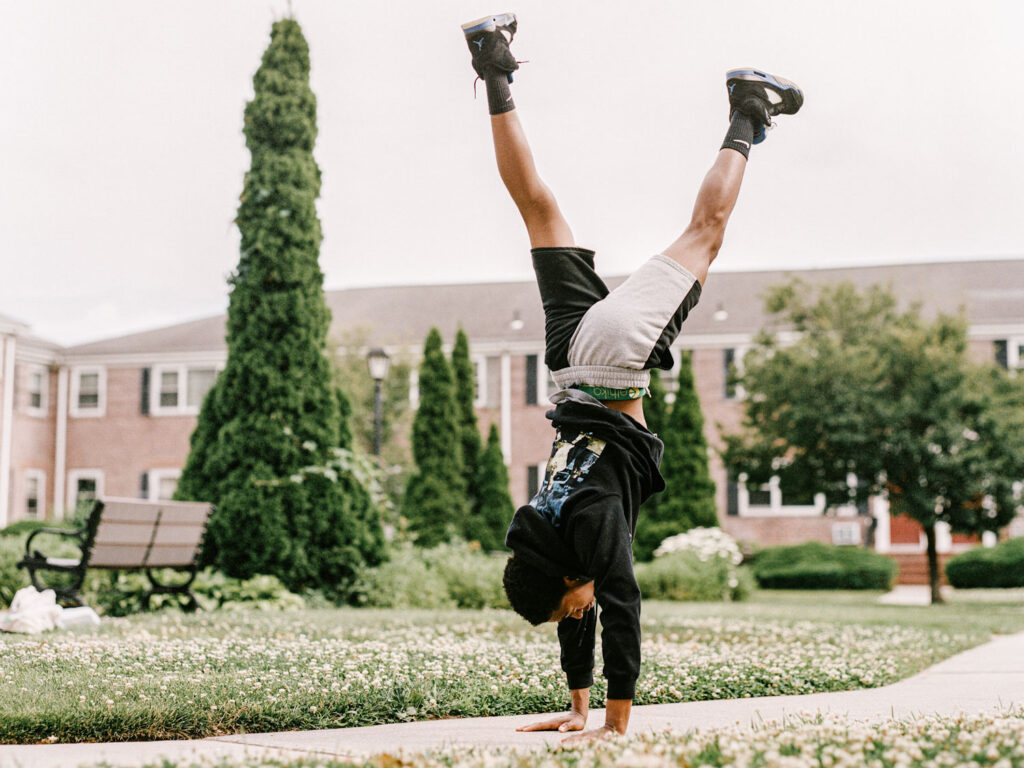
In reflecting on the difficulties of his past decade, Camari chalks it up to a learning experience. His struggle culminates in a sort of enlightenment: that those who bullied him were more unhappy with themselves than anything else. “There were a lot of demons trying to take me down,” he says. “There was a lot of animosity in that [previous] building. Now I just feel like I think before I open my mouth… I think about how that person feels.”
Camari will return to school in the fall for his senior year. He speaks on this and the future beyond with intention, excitement, and poise. He hopes to go to college or into the military, to study real estate, registered nursing, psychology, or teaching. “I love science,” he says. “So, I’m thinking maybe I could study science and become a researcher or a scientist.”
Though he knows these next steps will take work, Camari’s commitment manifests in a full and vivid picture.
“I want to go to Arizona or Florida. Even Texas. I think I’m a southern lover. I’m a palm tree type of person. I like the tropical. I want that tropical life. When I settle down, when I start my career, and buy my house—that’s all I want.” He pauses, then continues, “My life is starting now.”
Scaling Up Success Through Legislative Advocacy
Our advocacy work in the last year was marked by victories for trafficking survivors, homeless youth, and public housing residents.
2022 ANNUAL REPORT
Scaling Up Success Through Legislative Advocacy
Our advocacy work in the last year was marked by victories for trafficking survivors, homeless youth, and public housing residents. We also set the stage to push forward reforms to criminal record, juvenile interrogation, and tenant protection laws.
In years past, vulnerable New Yorkers were often prosecuted for prostitution and other crimes while being exploited by human traffickers. Convictions could lead to future difficulties in obtaining employment, housing, education, and other opportunities.
More survivors of trafficking and gender-based violence will be able to move forward without the stigma of a criminal record thanks to New York State’s Survivors of Trafficking Attaining Relief Together (START) Act, which broadens the avenues for victims to clear convictions for crimes stemming from their trafficking experiences. START was signed into law in November 2021, following a vigorous five-year campaign by the New York Anti-Trafficking Network and the START Act Coalition. As a member of both groups, The Legal Aid Society’s Exploitation Intervention Project (EIP) played a leading role in the effort, helping put together over 90 letters of support for the legislation, and to arrange for former EIP clients and other trafficking survivors to share their stories with lawmakers.
In just a year, the law has proved to be life-changing for EIP clients, with the Manhattan District Attorney’s office not objecting to a single motion filed to vacate a survivor’s conviction. That success come on top of the nearly 2,000 prostitution convictions dismissed through EIP’s work over the last decade.
Passage of the START Act provides strong headwinds for the Criminal Defense Practice’s continuing efforts to advance the Clean Slate Act, which would establish a process for sealing criminal records for millions of New Yorkers blocked from employment and housing due to their past convictions.
We also proved our ability to quickly respond to a rapidly changing political climate in Albany. When lawmakers threatened, in eleventh-hour negotiations on the state budget, to roll back reforms enacted to state bail and discovery laws in 2019, we stepped in and held off changes to the latter that would inevitably result in the jailing of more Black and Brown New Yorkers. In the next session, we will continue to press for the restoration of state bail laws to their 2020 form, ensuring more people are protected from being needlessly subjected to paying cash bail for minor crimes.
We will also prioritize in the coming year, as part of our overall decarceration campaign, passage of the Treatment Not Jail Act, which would ensure New Yorkers with substance use and mental health challenges are allowed to seek medical treatment in lieu of being imprisoned.
The Juvenile Rights Practice continues to bridge gaps in protections for vulnerable young New Yorkers. When detained by the police, many youth falsely confess to crimes because they are unaware of their right to remain silent and to be provided an attorney. We will push for passage of a state law – which enjoys broad support among a coalition of law enforcement, judges, and advocacy groups – that would guarantee young people are afforded counsel before they waive their Miranda rights.
At a time in which millions of New Yorkers were susceptible to losing the roof over their heads, our Juvenile Rights and Civil practices joined efforts to usher a bill through the New York City Council providing, for the first time, rental assistance to 18-21-year-olds in the city.
The Civil practice remains committed to ensuring all New Yorkers have access to affordable and safe housing. A month before the state’s eviction moratorium expired, we secured a state law increasing rental subsidies for low-income residents, thereby allowing 2,300 families in New York City to remain in their homes. Living conditions for those in public housing – who have suffered for years from utility outages, sewage overflows, and rodent infestations – will improve thanks to our efforts to enact legislation creating a Public Housing Preservation Trust that will fund repairs to 25,000 housing units in the city.
With public outrage growing over soaring evictions in the wake of skyrocketing rents in New York City, we will step up our pressure on Albany to enact “Good Cause” legislation that would afford basic protections against unjust rent increases and unwarranted evictions. While we were not able to get the measure through the Assembly in the last session, we were able to beat back a proposed tax break for real estate developers that would have cost taxpayers tens of millions of dollars in exchange for purportedly creating more affordable housing.
Client Stories: Cynthia Saldana and Ashley Pagan Fight for Their Home
The mother and daughter are part of a lawsuit brought by The Legal Aid Society to force repairs in their Bronx apartment building.
2022 ANNUAL REPORT
Client Stories: Cynthia Saldana and Ashley Pagan Fight for Their Home
When a storm rained sheets of water through Cynthia Saldana’s closed bedroom window, she bought the materials to fix it herself. When the bathroom ceiling burst, drenching her clothing closet, she didn’t lose hope. Even a mushroom growing out of the molded wall wasn’t Cynthia’s last straw.
But when a gas leak was discovered in January at 1349 Stratford Avenue in the Bronx, gas lines for the entire building were shut off. As of August, Cynthia and her 26-year-old daughter, Ashley Pagan, still have no gas in their home. The never-ending outage made the deterioration in Cynthia and Ashley’s longtime home begin to feel unmanageable. It also began to represent something larger than just physical damage. The women felt forgotten.
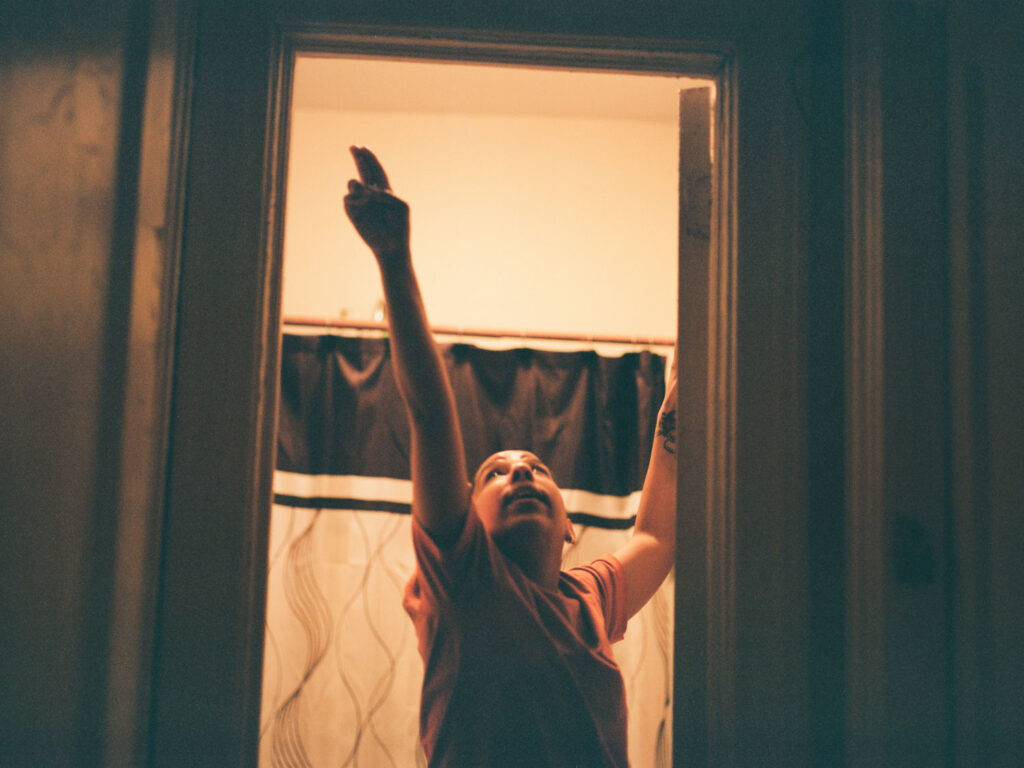
Three generations of Cynthia’s family have shared the apartment at 1349 Stratford for close to two decades. Many residents in the 72-unit building have lived there even longer. For years, the building management has worsened.
Combined with the outage of gas at 1349 Stratford Avenue, tenants also experienced periods of lack of heat and hot water. No gas meant no functioning stoves and ovens. Complaints went largely unanswered. Over the winter, Cynthia and Ashley’s dog, Archie, a thick and stout corgi, was freezing. The women worried about leaving a space heater on because of the recent and fatal fire at nearby Twin Parks North West.
Since January, the two women have relied on a hot plate to cook: a small, weak, and inefficient electric device that adds to their rising electricity bills. Hot plates have no oven mechanism and take an excessive amount of time to heat; cooking rice takes 15 minutes on a stovetop, but close to an hour on a hot plate.
Tenants are forced to rely on unhealthy food options like fried food, which is faster to make, or takeout. The women work full time, but financial strain is a growing challenge the longer they go without a working kitchen.
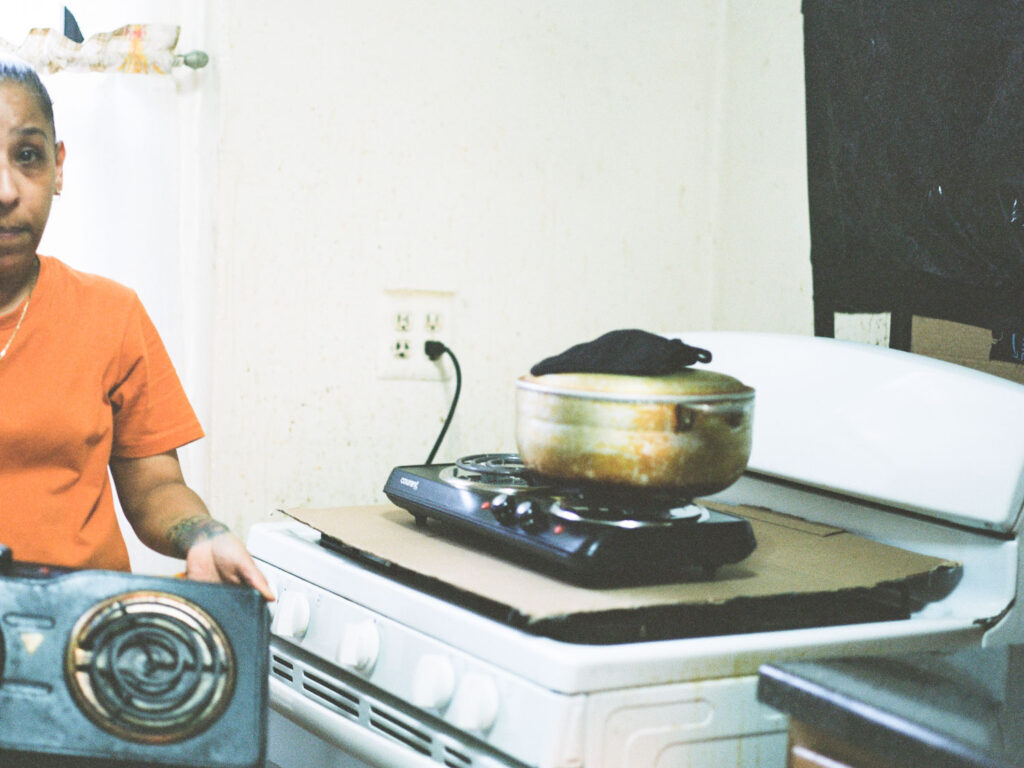
To advocate for tenants’ rights in low-income communities, and with funding from the City’s Anti-Harassment Tenant Protection program, The Legal Aid Society created the Housing Justice Unit-Group Advocacy Project. Their goal is to work with those facing harassment and displacement to keep them and their families in their homes. They focus on maintaining stable and healthy living conditions for these residents, preventing landlords from taking advantage of their tenants. Residents at 1349 Stratford, including Cynthia and Ashley, connected with Legal Aid lawyers Ben Seibel and Russell Crane through the office of State Senator Luis Sepulveda.
Seibel and Crane held tenant meetings where people could express their frustrations, share their stories, and air complaints in a safe environment. Both Cynthia and Ashley attended these and were vocal about their issues. After the meetings, Legal Aid filed a lawsuit representing 41 of the apartments (over half of the building) against the property owners and management. Complaints included cockroach and mice infestations, mold, lack of gas, malfunctioning outlets, holes in walls, and leaks, among a slew of other violations.
New York is Cynthia Saldana’s home. She moved here from Puerto Rico at age 6. She raised her daughter here, and her mother is in a nursing home nearby. She calls herself a helper and manifests this energy around her, “I like to help everybody. But don’t take my kindness for weakness either. If I see someone struggling, I will sit there and help that person.” She was thrilled when Legal Aid signed on to represent the tenants in their fight. And though the process hasn’t been easy, she’s seen progress.
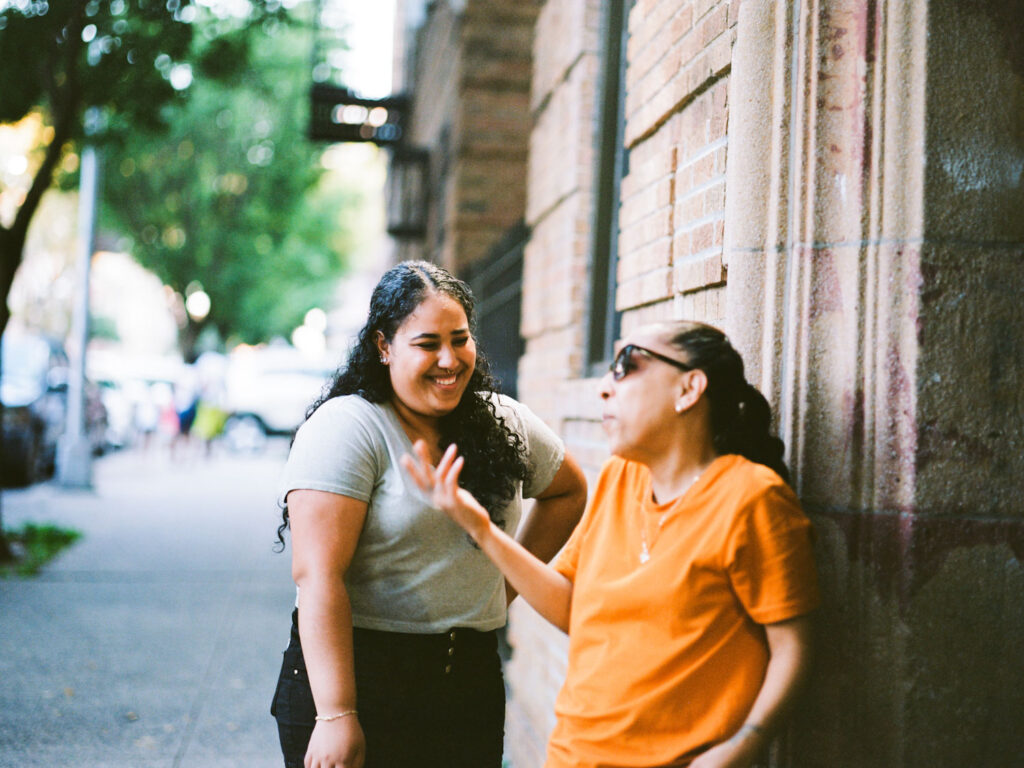
Long-term solutions for gentrification, displacement, and decaying property must emphasize systemic change and can’t rely only on legal action. Housing Court must take these cases seriously by using their authority to impose civil penalties and hold landlords accountable through the Court’s contempt powers to ensure ordered work is completed. But the 1349 Stratford lawsuit, and other similar lawsuits, are a vital step in catalyzing repairs while also raising awareness of how to combat careless management of buildings, particularly those inhabited by low-income communities and communities of color.
—
As a result of the lawsuit, gas lines have slowly but surely begun to be replaced at 1349 Stratford. Cynthia hopes theirs will be fixed soon and they can resume some sense of normalcy and routine in their lives.
Standing outside of 1349 Stratford on a humid summer evening, Cynthia and Ashley take in the neighborhood. A family with young kids exits the building, and the neighbors share a sympathetic moment. The adults chat while the two young girls stare, wide-eyed, at Cynthia. The women complain lightheartedly about the building but seem at ease as they vent. Their hope has been challenged, but this is their community. This is their home. “We have a lot of memories here,” Cynthia says. “Good ones and bad ones. It is what it is. Life goes on. We just want to be comfortable.”
Effecting Systemic Change Through Strategic Litigation
The Legal Aid Society obtains economic relief for its clients today, as well as systemic solutions that protect future generations of New Yorkers, through impact litigation.
2022 ANNUAL REPORT
Effecting Systemic Change Through Strategic Litigation
The Legal Aid Society also obtains economic relief for its clients today, as well as systemic solutions that protect future generations of New Yorkers, through impact litigation.
We reacted swiftly when the state prematurely shut down the Emergency Rental Assistance Program portal in December 2021, at a time in which hundreds of thousands of New York families were behind on their rent due to the COVID-19 economic crisis. We filed suit immediately, and a month later the portal began accepting rent relief applications again. In all, more than $2 billion has been distributed through ERAP to keep low- and moderate-income families in their homes, including another $800 million added to the fund by the state last spring, and $100 million in October by the federal government.
Our strategy of identifying systemic problems within the justice system through our direct representation work, then addressing them through litigation, proved itself when we settled a lawsuit against discriminatory practices by the Port Authority Policy Department (PAPD). The issue was identified in 2013, when attorneys at our trial offices noticed a pattern of plainsclothes PAPD officers arresting LGBTQ+ people in Port Authority Bus Terminal bathrooms on false charges of public lewdness and exposure. We sued PAPD in 2017, and the settlement we reached this year brought a halt to these patrols by officers in the bus station, and mandated sensitivity training for new PAPD recruits.
We are also pressing forward with our ongoing effort to address systemic failures within the New York carceral system, and to hold the Department of Correction (DOC) accountable for these deficiencies. Sadly, every week seemingly brings the news of another death of an inmate on Rikers Island, and yet on its watch DOC still allows thousands of inmates to miss critical medical appointments. The Legal Aid Society filed a class action suit to help stem this humanitarian catastrophe, and the State Supreme Court responded by first ordering DOC to ensure people make their appointments, then fining the agency when it failed to fulfill the order. We are also pressing for the appointment of a federal receiver in our longstanding class action about brutality in the jails, and while that outcome has been delayed by a federal judge, we will continue to press for the necessary change to protect our clients from harm.
The Legal Aid Society is also employing litigation to help ensure children in foster care are placed in the best home environments in New York City, where every day relatives are denied the right to take care of these children because of criminal convictions that can stretch back to decades ago. We filed suit to compel the City Administration for Children Services to reverse these rules, which disproportionately affect low-income people of color, and allow “kinship placements” that provide a sense of stability to children coping with the trauma of having their families disrupted.
Make a Meaningful Impact
Every day, The Legal Aid Society changes the lives of our clients with the help of our generous supporters. Stand with us.